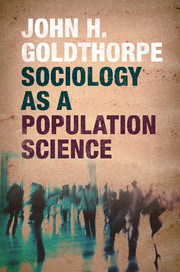Book contents
- Frontmatter
- Dedication
- Contents
- Acknowledgements
- Introduction
- 1 Sociology as a population science: the central idea
- 2 Individual variability in human social life
- 3 The individualistic paradigm
- 4 Population regularities as basic explananda
- 5 Statistics, concepts and the objects of sociological study
- 6 Statistics and methods of data collection
- 7 Statistics and methods of data analysis
- 8 The limits of statistics: causal explanation
- 9 Causal explanation through social mechanisms
- Conclusion
- References
- Index
3 - The individualistic paradigm
Published online by Cambridge University Press: 05 December 2015
- Frontmatter
- Dedication
- Contents
- Acknowledgements
- Introduction
- 1 Sociology as a population science: the central idea
- 2 Individual variability in human social life
- 3 The individualistic paradigm
- 4 Population regularities as basic explananda
- 5 Statistics, concepts and the objects of sociological study
- 6 Statistics and methods of data collection
- 7 Statistics and methods of data analysis
- 8 The limits of statistics: causal explanation
- 9 Causal explanation through social mechanisms
- Conclusion
- References
- Index
Summary
In sociology, understood as a population science, an ‘individualistic’ rather than a holistic paradigm of inquiry is required because of the high degree of variability existing at the individual level, and, further, because individual action, while subject to sociocultural conditioning and constraints, has to be accorded causal primacy in human social life, on account of the degree of autonomy that it retains.
Boudon (1990; see also 1987) provides a clear statement in principle of the case for an individualistic, as opposed to a holistic, paradigm of inquiry in sociology, acknowledging its origins in the work of Max Weber (see esp. 1922/1968: ch. 1). Boudon emphasises that the individualistic paradigm does not involve ‘an atomistic view of societies’, nor a denial of the sui generis reality of sociocultural phenomena and of the ways in which they may motivate, constrain or otherwise pattern individual action (1990: 57). In other words, there is no claim of ontological individualism: that is, no claim that only individuals exist (or, to quote Mrs Thatcher, that ‘there is no such thing as society’). Rather, the argument is for methodological individualism (Popper, 1945: vol. 2, ch. 14; 1957: ch. IV): that is, for the position that sociocultural phenomena have themselves to be accounted for, in the last analysis, in terms of individual action. While it may be entirely reasonable for the purposes of many sociological inquiries to take certain such phenomena as givens, rather than as the explananda of immediate interest, it still remains the case that if they were to be explained, this could only be by reference to individual action and to its present or past, intended or unintended, direct or indirect consequences (see Hedström and Swedberg, 1998a; Elster, 2007: ch. 1).
The principle of methodological individualism is one that might well be taken as ‘trivially true’ (Elster, 1989: 13). Difficulty in accepting it would in fact appear to arise either because of a failure to see that methodological individualism does not entail ontological individualism or because of an insistence that individual action is always influenced by the social conditions under which it occurs – a claim that could also be regarded as trivially true, but without being in any way damaging to methodological individualism.
- Type
- Chapter
- Information
- Sociology as a Population Science , pp. 32 - 43Publisher: Cambridge University PressPrint publication year: 2015



